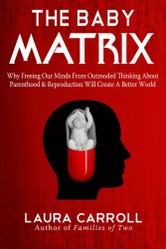 Do you know the true facts about infertility? Chances are unless you've been affected by it yourself, you probably don't. Even if you are affected, you may feel alone, depressed, or some how at fault for your condition when you are absolutely not to blame. Here are some basic data and statistics about infertility that you should be aware of (taken from Discovery Health and elsewhere):
Do you know the true facts about infertility? Chances are unless you've been affected by it yourself, you probably don't. Even if you are affected, you may feel alone, depressed, or some how at fault for your condition when you are absolutely not to blame. Here are some basic data and statistics about infertility that you should be aware of (taken from Discovery Health and elsewhere):
* In America alone, infertility affects over 6 million women and their partners - that's about 10 percent of the reproductive age population. One in six couples will encounter difficulty getting pregnant and experience infertility to some extent.
* Infertility is not always "the woman's fault" - indeed, infertility affects male and female reproductive systems nearly equally. In approximately 30% of all infertility cases, there are both male and female factors causing difficulty in achieving successful pregnancy.
* In approximately 30% of cases, the causes will remain "unexplained infertility" despite full medical work-ups and extensive diagnostic testing. This only points out the complicated nature and many causes of infertility, and how even today medical science cannot provide all of the answers.
There is no such thing as a "miracle cure for infertility", despite thousands of websites and unscrupulous individuals promising such. The causes and reasons for infertility are far too numerous and different to all be "solved" by one single approach or drug product.
* Infertility is a disease. Albeit it took until 2009 for the World Health Organization to officially define infertility as a disease. This was an important milestone in recognizing the serious medical nature of infertility and helping to bring it more recognition and hopefully governmental and scientific support.
* Infertility is a disability. In 1998, the U.S. Supreme court held that infertility is a disability under the Americans with Disabilities Act (ADA). However, most insurers in the United States still provide no coverage - or only extremely limited coverage - for medical treatment related to infertility. Many of those affected with infertility have to struggle in the workplace not just to afford expensive IF treatments but to receive fair treatment and understanding if they must take time off for procedures, testing, or rest during a difficult pregnancy.
Image credit


 Do you know the true facts about infertility? Chances are unless you've been affected by it yourself, you probably don't. Even if you are affected, you may feel alone, depressed, or some how at fault for your condition when you are absolutely not to blame. Here are some basic data and statistics about infertility that you should be aware of (taken from
Do you know the true facts about infertility? Chances are unless you've been affected by it yourself, you probably don't. Even if you are affected, you may feel alone, depressed, or some how at fault for your condition when you are absolutely not to blame. Here are some basic data and statistics about infertility that you should be aware of (taken from 


 Infertility can leave a person feeling isolated, alone, as if no one knows what you are going through. No one can understand.
Infertility can leave a person feeling isolated, alone, as if no one knows what you are going through. No one can understand.


 Far too often, infertility is a disease that is ignored by healthcare professionals, the government, insurance companies and the media. It is not seen as "important" as other health issues and conditions, despite the fact that so many people are affected by it worldwide.
Far too often, infertility is a disease that is ignored by healthcare professionals, the government, insurance companies and the media. It is not seen as "important" as other health issues and conditions, despite the fact that so many people are affected by it worldwide.








 A Potentially Fatal Accident in the Homeon 11/24/2018
A Potentially Fatal Accident in the Homeon 11/24/2018
 Windsurfing Lessons on Montserrat: One of My Funniest—and Fondest—Travel Memorieson 11/20/2018
Windsurfing Lessons on Montserrat: One of My Funniest—and Fondest—Travel Memorieson 11/20/2018
 Christmas Ornaments Celebrating Rome, Italyon 11/12/2018
Christmas Ornaments Celebrating Rome, Italyon 11/12/2018
 Philadelphia-Themed Christmas Ornamentson 11/09/2018
Philadelphia-Themed Christmas Ornamentson 11/09/2018



Comments
@Mira - well, the laws (and insurance coverage regulations) are a bit tricky on the subject. Basically the issue of disability protection is that, say, an employer shouldn't be able to discriminate against someone undergoing fertility treatment/they should have to accommodate the person's schedule (which can involve lots of doctor's office visits on a very specific schedule.) But whether fertility treatments are or should be covered by insurance is much up to debate, and varies a lot in the U.S. on a state-by-state basis. I know that in some countries, with universal health insurance coverage, that healthy individuals under a certain age are covered for one cycle of IVF and other basic testing, for instance. But beyond that, they are on their own...and I don't necessarily think that's wrong. There are some people who will never accept that they aren't going to get pregnant, not after 3, 4, 5, even 10 failed IVF cycles and will keep going through it until they're broke/too old to try any longer. I don't feel that should be covered by insurance because it's the patient's choice to do that, and when there are other ways to move forward after being diagnosed as infertile (look into adoption, or accept/move forward with a childfree future.)
You've made some great points. I know of a couple who's really struggling with infertility, as they're both older and they wonder when it will happen. They don't talk much about it, but it's quite an issue. I am happy it was recognized as both an illness and a disability, but I don't understand why couples have to spend so much money if it's now treated as a disability.